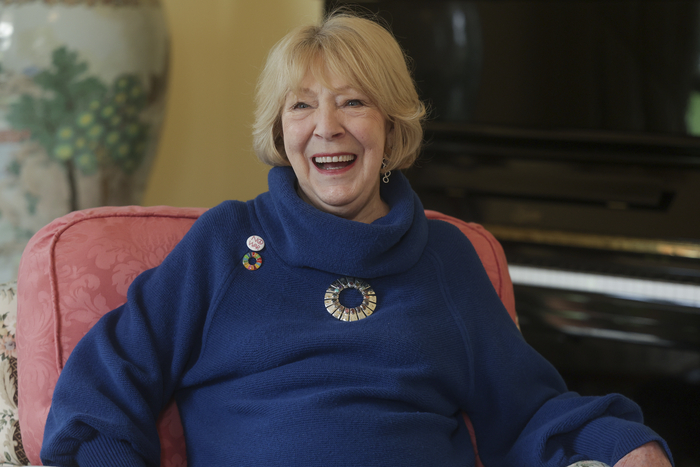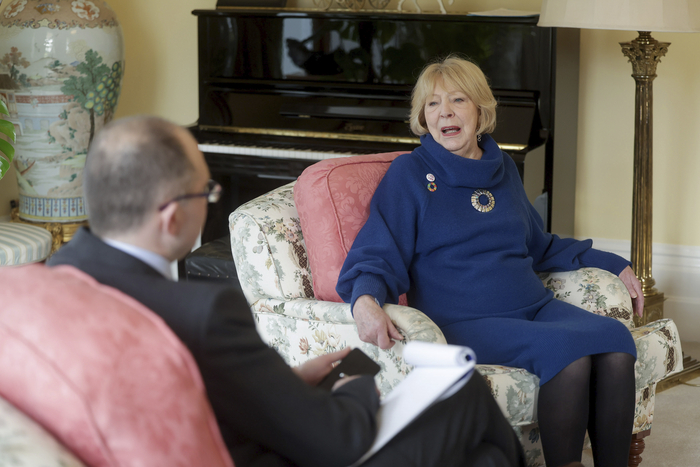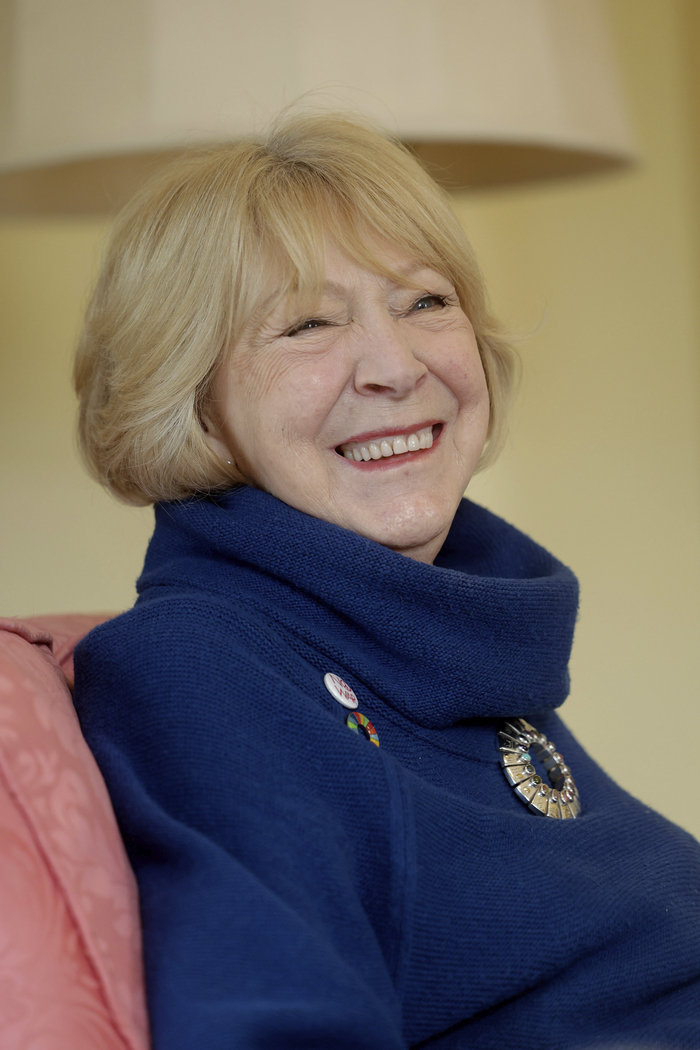When Sabina Higgins welcomes you into her private office before a long-scheduled interview, immaculately turned out in an azure, roll-neck woollen dress with anti-war and global sustainability badges pinned to her shoulder, you know she means business.
Like an inquisitive professor-cum-detective inspector, she immediately quizzes the Advertiser on whether he has read any of the topical political analysis books she has balanced on a side table. Paintings from exotic Tigray hang opposite photos of Shantalla in the bowels of Áras an Uchtaráin. Old invites to Windsor Castle and Liberty Hall peep out from a pile.
Judging by the height of documents amassed on their desks, Mrs Higgins and her assistant, Helen, are very, very busy women. Moments later, Sabina’s office tour concludes with follow-up queries to ensure I have jotted down the authors I must now read if I ever dare to return. Seconds in, and the pace is already relentless.
Michael D passes with a friendly greeting on the Georgian back stairs, carrying notebooks and followed by his enormous dog, Misneach. Army officers in dress uniform scurry about preparing for afternoon visits from Western Sahara’s president Brahim Ghali, and Vermont senator Bernie Sanders. Women in crisp, white linen ferry pots of tea all over the shop. It’s like Downton Abbey crossed with Fr Ted set in UCG’s Student Union circa 1989.

Sabina Higgins, Ireland’s self-labelled “first woman”, to avoid the grander, perhaps hollower epithet ‘First Lady’, strides through the clamour of her home of 13 years like a serene field marshal, talking to military personnel, kitchen staff and her husband, the President of Ireland; all addressed with the same broad, beaming smile. A tall woman, she leans in, conspiratorially, when she talks with people.
Socialism in action
This rare glimpse of ferocious activity behind the ceremonial façade of Phoenix Park’s grand lodge illustrates that - at least back-stage - Mrs Higgins, a classically trained actress, appears primus inter pares: first amongst equals. Whereas on the national and world stages, she must play a lowly support to her husband’s leading role: “And, quite rightly too,” she affirms, “I have no mandate.” Her husband, of course; Ireland’s first Labour and latterly first non-party president, with 822,566 votes in 2018, has the largest mandate this republic has ever seen.
“Of course I’m a socialist,” she staunchly retorts to a blunt question about her worldview. “My interests are in peace and the planet, and I think it’s only really through socialism that you’ll get that [through] love for people… all socialists are environmentalists.”
Sabina lists UN sustainability goals like a hurler from Kilchreest recalling St Thomas’ midfielders – with the assurance of mastery over their chosen topic. A lover of theatre and film, she regularly drops references to Chekhov, Ibsen, Brecht and Brando. With poise, elegance, intellect and forthrightness, there’s no doubt the 82-year-old, life-long political activist would have made a formidable politician in our nation’s capital in her own right. Instead, she moved to Dublin as a youngster and studied theatrical movement via the Stanislavski Method, and was also an early, lifelong adopter of Yoga decades before it became fashionable.
“I love Dublin, I have to say,” Sabina confesses. “When I was young, I accomplished all those things in the theatre here. I saw the great plays, got so much knowledge of the world and literature, and everything was wonderful, and I thought I’d never leave… And then I met Michael – at a party. I really didn’t think I could leave the theatre. It was so important. But I did. And then I went to Galway. And it was a whole different world...”
She met “my Michael” aged 27 and was married aged 31. He is one year older. Of course, young Mrs Higgins was no stranger to Galway when she moved back here as a newlywed.

Rural childhood
Sabina Coyne grew up on a small farm in Cloonrane, past Milltown, in that rich, twilight countryside where you’re never sure if you’re in county Galway or Mayo.
“It was an idyllic childhood,” she remembers. She crossed a tributary of the River Robe every morning going to national school in Ballindine, then attended the Convent of Mercy in Claremorris.
Her parents, Mary Kilkenny and John Coyne, held a mixed farm with sheep, cattle, pigs, oats, barley, carrots and parsnip.
Her father and brother sometimes cut peat with a sleán during Lent, which meant they were “permitted” to eat eggs and rasher sandwiches out on the bog, delivered by Sabina or her sisters bearing flasks of hot tea.
Although allowed to help spread the turf and turn the hay, Sabina’s mother dissuaded the girls from most farm work “because we were to study, and get an education, and go and find jobs. We got off lightly really,” she sighs, although the old turf tongue of sleáns, clamps, crucháns and reeks trips from her lips with practiced ease.
Sabina doesn’t recall her Catholic household being more or less religious than others’. They recited the rosary nightly, went to Mass weekly, and fashioned the Crib each Christmas.
One brother, Pat, and ten of her first cousins, were priests of the Holy Ghost Fathers, or nuns of the Holy Rosary Missionary Sisters in Bandra, outside Mumbai. Her sister Margaret was twenty years with the Daughters of Charity building an eye clinic in famished, war-torn Ethiopia. Margaret has retired to London now. When she visited home in Galway, Sabina remembers Margaret would buy up all the pen torches in Duffy’s fishing shop on Mainguard Street to equip the Ethiopian nurses. When the Coynes venture forth from Cloonrane, they try to make the world a better place.
Former Labour Party leader Pat Rabbitte and current Green Party senator Pippa Hackett hail from the same, rural district. Was the Coyne farm a political house? “No. Not at all. I think we were Fianna Fáil, but Daddy would never have been involved in a political party. It just wasn’t part of our life.” Africa, the Missions, farming and Charles Dickens read aloud by her mother were kitchen table topics.
So beneath the sophisticated thespian, is she an agricultural, country girl at heart? “No. But I consider Ireland is. And with the UN’s sustainable development goals, this is what is important: The Earth. This is what’s to be saved.” Sabina is too savvy to be derailed by a leading question, and although she does light-up talking about compulsory tillage during The Emergency, she brings the same animation to discussing socialist republican Big Jim Larkin, the importance of breast feeding, playwright Sean O’Casey, her children Alice Mary, Daniel, twins John and Michael Jnr, and grandchildren Fiadh and Finn.
One suspects her avowed ecological socialism springs not just from Connolly or Marx, but from a farm-born love of The Land, shaped by humble childhood Christianity, and her description of “the co” of her youth, where neighbouring households ploughed the land co-operatively. Michael D may have rubbed off on her too.

The (first ) lady doth protest too much
A conversation with Sabina Higgins is a hurricane of very old and very new ideas intricately blown together. Next time you see her on TV politely whispering into the ear of a visiting prince or president’s consort, note their eyes widen: it’s not the weather she’s small-talking about. The tales she tells off-the-record would make the protocol section of the Department of Foreign Affairs instantly implode.
Of course, Sabina’s outspokenness has dunked her into a constitutional cauldron of trouble too.
In July 2022, the Irish Times printed a letter from ‘Sabina Coyne Higgins, Dublin 8’ criticizing the newspaper for an editorial on the Russian invasion of Ukraine which failed to mention negotiation as a possibility for peace. Ostensibly correspondence from a private citizen quoting WWI poetry, it caused ructions from Dublin Castle to the Kremlin.
“Oh, I’m so proud of that,” deadpans Sabina. “The letter was good. [The furore] was purely people seeing a little wedge so they could have a go at Michael.” Has this experience chastened Sabina from speaking out as a life-long anti-war activist? “Certainly not,” she bristles, adding that she is planning to join a protest march against the “shocking, just shocking” situation in Palestine, and is scheduled to open an ‘Art for Gaza’ auction in Dublin today, February 29.
Just as presidents Robinson, McAleese and now Higgins have pushed the boundaries of the Irish presidency in modern times, does she feel she has done the same for the presidential spouse?
“Now I do notice that when I first came [to the Áras] I was doing things every day, as that is what I pledged,” she says. What is unspoken is that 13 years in, Sabina has rowed back a little, understandably. She has attended countless state occasions, and pointedly notes that official gazettes omit the presence “of the person who accompanies the President”. Her most memorable achievement is having 100 women in the Áras breastfeeding together for a health promotion: “Can you imagine the spectacle?! But the media only printed one photo of a girl feeding her baby in a corridor with a blanket around her,” she says, derisively.
There are echoes of past presidents and even viceroys throughout Áras an Uchtaráin, but Sabina says the legacy of their partners is undetectable. “I was happy to devote my life to him,” says Mrs Michael D Higgins, explaining that she never sought to emulate barrister Cherie Blair, dentist Martin McAleese or businesswoman Celia Larkin; prominent partners of politicians who forged their own, separate careers, as well as being expected to accompany their respective prime minister, president and taoiseach.
End of term
“There are a lot of demands on him,” says Sabina of President Higgins. The Constitution stipulates the president must either sign a bill into law or notify the Supreme Court within seven days of receipt. In 2021, Michael D publicly complained when he received nine bills in one day. Sabina recalls during his first term, much of the Higgins’ time was spent in recession Ireland. Michael D’s second term has had much more international flavour, and perhaps Sabina is concerned about her octogenarian husband’s gruelling schedule?
She bats away the question, and instead explains the routine in the Áras during Covid restrictions where a frenetic pace was maintained via Zoom. Visitors disappeared, staff retreated, and family contact ceased. Were the Higgins' lonely? “I would never be lonely with a book. I love the sky, and I love the grass,” she says, nodding to the manicured lawns and views south to the Dublin and Wicklow Mountains.
And when this 14-year adventure in the Big House finishes?
“Oh back to Galway – definitely,” she confirms, yet there is a sadness in Sabina rather than expectation of a chapter concluding triumphantly. “We just couldn’t believe the world would get to this state,” she laments. “This is one of the worst, critical times. War and the terrible things happening in Gaza, and climate change, and inequality, and violence. Everything was getting better, [but] then you hear of children in school bullying and insulting each other… There is division and such polarization.”
Door-to-door memories
Sabina is no negative person, and her concern for the world follows long conversation about improvements in Ireland from the 1950s to present.
She could write a book about advances she witnessed whilst politicking across Galway West from 1969 to 1999: Connemara’s left-wing “rural rebels”; a record 25 after-Mass rallies in one day; being hauled from doorway conversations by comrades “like an eejit” because she didn’t twigg a Fianna Fáil or Fine Gael household; played into towns by Trades Union bands; clashes with opposing activists. She drops names of seasoned political veterans she canvassed alongside: Gabriel Henry, Niall Kelly, Helen Gaughan, Peter Kenny, John Cunningham, and visitors to Galway who energised such as Nell McCafferty and Conor Cruise O’Brien.
Indeed ‘energised’ and ‘delighted’ are words she uses to describe the vast quantity of letters and flowers she received from people across Galway last year when she was battling cancer. “It definitely helped me get better. I'm so grateful.”
With chat now flowing, Sabina has warmed up. A skinny young dog, Luna, bursts through the door making a dash for a platter of perfectly triangular presidential sandwiches, followed by the sounds of Sabina’s three sons and granddaughter Fiadh coming for a spring visit. Security lasso the dog while Sabina welcomes her boys – her daughter, Senator Alice Mary Higgins with new baby Finn, are not here today.
“I just smile at him without even knowing why,” says Sabina, who missed out on two years of “our wonderful, glorious redhead” Fiadh (4 ) due to Pandemic restrictions.
The Advertiser declines an invitation to join Ireland’s first family for lunch. President Higgins wisely says nothing to the insolent hack poised to trespass on precious, private time, except to decline a copy of last week’s Galway Advertiser: “We get it delivered to the Áras. We like to keep up with what’s happening at home,” he proclaims. Diplomacy in motion.
Unease is expressed about the Advertiser’s long journey back west. Sabina is verging on full-blown Mrs Doyle with her insistence on half-starved journalists pocketing fruit and nibbles. Her empathy and concern are real, whether for the pain of war, the planet or the worker standing next to her. Cloonrane can be proud.

